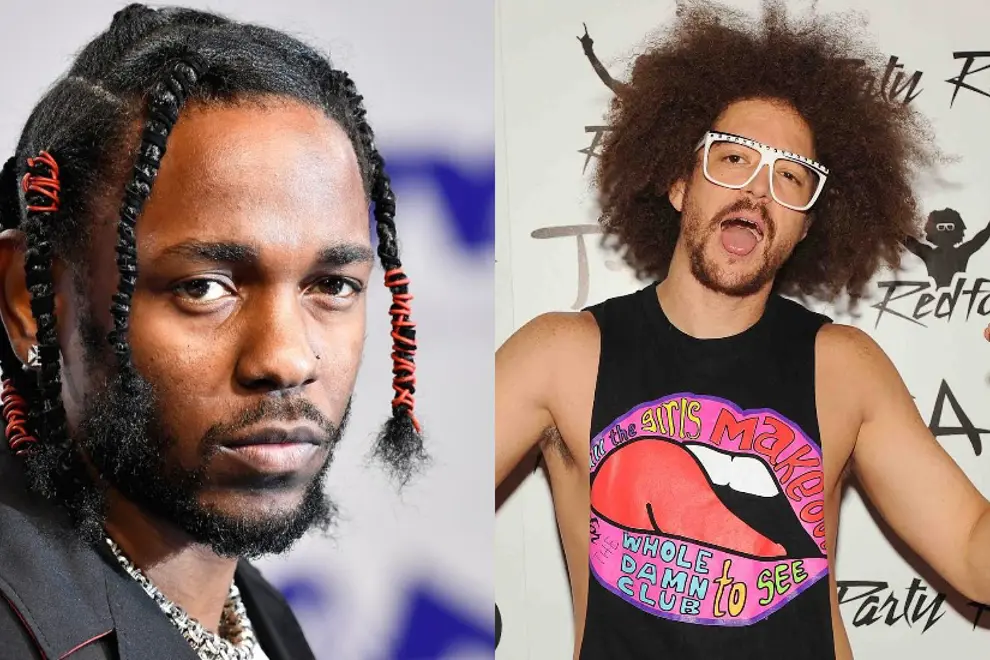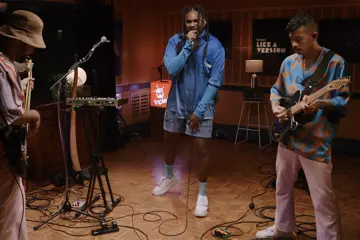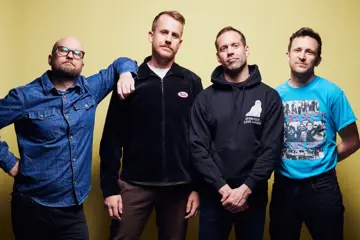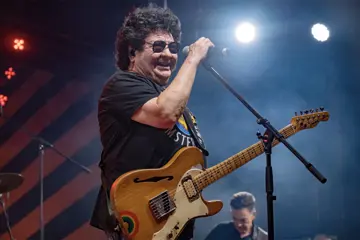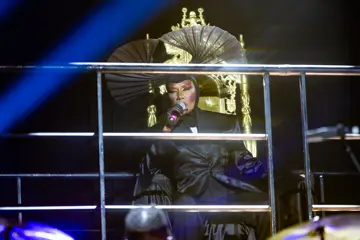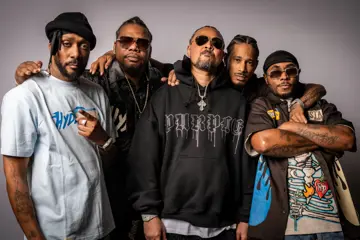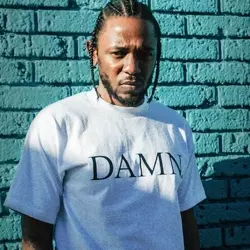 Kendrick Lamar
Kendrick LamarRedfoo is, as per Wikipedia, “an American rapper, singer, composer, dancer, record producer and DJ.” It’s a pretty noble attempt, but it fails to factor in some of the sheer inexplicability that swirls around the man.
An heir apparent to a once-legendary music empire who relocated Down Under, Redfoo – real name Stefan Gordy, son of Berry Jr. – cut a few seasons of The X-Factor, became a mainstay at the Australian Open and racked up a handful of ARIA plaques. He courted controversy, playing into the same shlock-for-exposure scheme that made Kyle and Jackie-O such persistent parasites; collaborated with both Stevie Wonder and Alvin and the Chipmunks, which shows some admittedly impressive range; and got glassed in a Sydney pub, an incident which saw him leave Australia for safer shores.
He made a sobering pass at solo stardom with 2016’s Party Rock Mansion, but it failed to live up to the anthem itself, tallying first week sales of 144 units in our once-dependable market. The sun set on the age of Foo, and his brief tenure became a slice of curious hit-making history. Chaotic though it was, that handful of years was but an episode in the greater life of Stefan Gordy, one which has seen him wear more hats than most. Even amongst those many hats – semi-professional tennis player, Wall Street day trader, athlete sponsor and Apple’s sole Morning Show fan, to name a few – one question lingers. How did Redfoo from LMFAO end up with a writing credit on Kendrick Lamar’s hit single King Kunta?
In the ‘90s, fresh out of Palisades High School, the youngest Gordy child made a pass at hip-hop greatness. I mean, why not? Everybody was doing it: Scott Caan, son of James and eventual Hawaii Five-O star, founded rap duo The Whooliganz with Daniel Maman, soon to be known as producer The Alchemist; Brian Austin Green, then a 90210 star, released a single record produced by Pharcyde member Slimkid3; and Nike heir, future Laika president and Bumblebee director Travis Knight cut an entire Bomb Squad-produced LP after grabbing their attention with a demo. After a decade of ascension, hip-hop was undoubtedly the wave.
Don't miss a beat with our FREE daily newsletter
Redfoo, however, had more than just the means: the Motown heir grew up in Los Angeles, a city dominating hip-hop in the early-’90s, and his father’s songwriting roles as a part of The Corporation could only suggest musical promise. His older half-brother Rockwell had some luck with Somebody’s Watching Me, albeit it short-lived and owing to MJ. All this to say, it’s no surprise Stefan fell into the funk.
That hunger for hip-hop was reflected in Motown’s own mission, though Berry Jr. had sold his stake in the label in 1988, finally succumbing to years of diminishing returns and financial hemorrhaging. Gordy’s successors were controversial and short-lived, and both Jheryl Busby and Andre Harrell saw limited success with artists like Boyz-II-Men and Johnny Gill of New Edition. They might’ve paled in terms of sales, but with Redfoo at the helm, Motown’s first family turned out a bonafide hip-hop touchstone – that’s one more than their former label managed in their tumultuous ‘90s.
Redfoo graduated in 1993, in the midst of one of hip-hop’s most transformative years. The gaze would soon shift away from the dominant gangsta styles of the West Coast, pivoting back to the likes of Wu-Tang, Mobb Deep, Nas and Biggie, but an ever-popular California still had much to say. Ahmad Lewis, a year beneath the musiciaan at Palisades High, clearly felt this way, managing to ink a record deal with GIANT as a final-year student. A contract means an obligation, and so the then-17-year-old emcee linked up with Redfoo to make a record. In his production role, he went by ‘Kendal,’ his middle name – a far milder guise than Redfoo.
Ahmad’s self-titled debut dropped in '94, when the emcee was just 18-years-old, and whilst the album didn’t necessarily take off, one particular single went from hit to history with its definitional take on reflection and longing. Back In The Day was produced by Kendal - a.k.a. Redfoo, in case you forgot - who helmed all but two of the ten tracks, and whilst it didn’t launch either artist into the stratosphere, it did become something of an iconic West Coast alternative hit.
Admittedly, Kendal’s production on that track has been eclipsed by the far more successful remix, but the point still stands: Redfoo had, in some way, hit gold. Back In The Day is one of the most iconic hip-hop songs of all time, if only for the everyday emotion it distils. It’s shorthand for rose-tinted nostalgia, a wistful reminiscence laid by an 18-year-old who still can’t buy beer or smokes.
It’s an influence that goes far beyond mere invocation, cropping up in palettes and moods without as much as a solid hook. Chance The Rapper’s Nostalgia – a standout on 10 Day, the record he laid during his titular school suspension – plays with the same juvenile reflection as Ahmad’s classic, doing away with his original Fatlip-inspired delivery and adding a mournful clarity to the understanding that all things are fleeting.
The spiritual place the song holds manifest in a string of samples from a 27-year-old Jay Rock, yet to break out alongside his mentee Kendrick Lamar; a 22-year-old J. Cole, who channelled the sentiment onto an obscure Kanye instrumental issued on his first mixtape; and a 22-year-old Trae tha Truth, who directly sampled and interpolated the anthem for a joint off his 2002 debut. It seemed, for a long time, the full extent of Redfoo's hip-hop legacy, but a strange twist of fate landed the producer-turned-eccentric-dance-music-personality another unexpected cosign. Though Back in the Day proved his most pressing contribution to hip-hop culture, it was Ahmad's album cut We Want The Funk that hit the hardest.
March 2015: Kendrick Lamar, coming off one of the most acclaimed records of the past decade, drops King Kunta, the third single from the then-upcoming To Pimp A Butterfly. It follows i, an affirming number released six months earlier, and The Blacker The Berry, a more powerful reflection steeped in a post-Ferguson America. Kunta doesn’t perform as well as i, but somehow, it seems all the more pervasive: here in Melbourne, it’s taking over the airwaves, drifting out of passing cars and landing on trendy café playlists. It hits #2 on the Triple J Hottest 100, beaten out by The Rubens’ Hoops. It’s called the second-best single of 2015 in the esteemed Pazz & Jop Critics Poll. It is, in all but sales, the biggest critical success of Redfoo’s career – that’s gotta hurt, seeing as he couldn’t have been less involved.
The Stefan/Kendal/Redfoo connection comes courtesy of We Want The Funk, an unabashed slice of mid-’90s West Coast hip-hop. It’s a song awash with familiar vocoder tones and G-Funk inflections, complete with backing vocals from Roger Troutman of Zapp, who’d reprise similar vocal duties on Tupac’s California Love the very next year. The two songs are a world apart – one saw a legendary West Coast producer link up with one of the greatest emcees ever, and the other was produced by Redfoo – but they both share undeniably strong refrains.
In fact, Ahmad’s joint might have the edge in terms of call-and-response hooks: We Want The Funk is as great a title as it is a phrase, a sharp four-syllable demand that conveys a real urgency. It’s a strength that’s fairly obvious, but even then, it’s hidden in a song largely forgotten by time. There’s really no telling how, but the track ended up on Kendrick’s radar, and he embraced that refrain as the outro, placing Ahmad and Stefan alongside fellow songwriters Thundercat, Johnny Burns, Michael Jackson and Kendrick himself.
It’s no surprise that Lamar would be drawn to a mid-90s, Troutman-featuring G-funk salute, and his reverence for Pac reached its peak at the close of TPAB closer Mortal Man. It’s a reverence that breaks through in the Director X-helmed music video for Kunta, which embraces some tenets from the iconic California Love (Remix) video – no, not the Mad Max one, the swap meet one, which Kendrick says he attended as a young hip-hop fan. King Kunta was a West Coast dedication of a single, and whilst Redfoo hasn’t commented on his credit, Ahmad seemed rapt to be involved:
"I got a call about a sample clearance last week, I didn't know the turnaround would be so quick. I'm grateful for the publishing check lol. Kendrick is the perfect emcee to use my music."
– Ahmad for DJBooth, 2015

Want to help us support the next generation of music, both Australian and international? Sign up to our Patreon now, not only will you help keep the lights on, but you'll also gain access to exclusive content, merch discounts and more.
That wasn’t the end for Redfoo's more conventional hip-hop career. The production credit on Back In The Day helped him secure a deal with Bubonic Records, and he linked up with fellow emcee Dre Kroon for their collaborative debut, 1997’s Balance Beam. The lowkey release ran 16 sample-laden tracks, with rhymes, rhythms and serious scratches mired in conventional hip-hop tradition. It was a long way from the music Redfoo would go on to make, and though it’s a solid decade older than his biggest hits, it hasn’t aged nearly as badly as something like Shots.
Balance Beam spawned two singles, Life Is a Game Of Chess and The Freshest, the latter of which featured emcee Evidence and was described by Vibe Magazine as “one of this past winter’s biggest indie hits.” It seems about the extent of the album’s impact, and after featuring on a track from The Black Eyed Peas’ debut album alongside fellow Palisades High alumni will.i.am, he broke from the industry. Red Foo returned as Redfoo, sans space, alongside his nephew Sky Blu in 2005. Thus, LMFAO was born.
There you have it. King Kunta was amongst the most lauded songs of 2015. Literally I Can’t, the controversial 2014 single on which Redfoo featured, was named the ‘Worst Song of the 2010s (So Far)’ that very same year.
One again, I’m forced to ask: how’s that for range?
PS: The video above - if you dare to click on it - feels a little different now, considering the whole coronavirus thing. Did Redfoo predict COVID-19 seven years before it happened? Stay tuned to find out (maybe).


